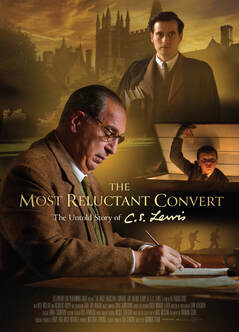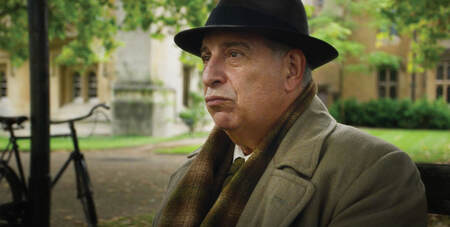
https://www.pluggedin.com/movie-reviews/most-reluctant-convert-2021/
Adapted from the celebrated 2016 stage play, C.S. Lewis on Stage: The Most Reluctant Convert by Max McLean (based on Lewis' semi-autobiographical book, Surprised by Joy), writer/director Norman Stone’s The Most Reluctant Convert is a brisk, whistle-stop tour through the life of acclaimed author C.S. Lewis. Unlike another, recent biographical drama, Tolkien, which focussed more closely on one of Lewis’ contemporaries, The Most Reluctant Convert squeezes key events of Lewis’ life into several minutes (or sometimes mere moments) of screentime.
At just 73 minutes, the result feels less like a feature film and more like a filmed testimony (albeit with impressive production design and cinematography), that doesn’t quite manage to transcend its stage-play roots.Thankfully, however, this is an honest and thoughtful portrayal of an imperfect man, which charts (in full) Lewis’ journey from aligning himself with atheism, then theism and his eventual conversion to Christianity. It’s a faith-building, intelligent film which carries with it real emotional power, and speaks to one of the many ways in which God intentionally draws humanity to himself.
Lewis’ reluctance to truly accept Christ as His Lord and Saviour, apparently stems from a variety of events which took place throughout childhood and later, as a teenage Lewis grew into adulthood. For instance, we learn that at the tender age of nine, Lewis watched as his mother succumbed to a battle with cancer. This not only led him to experience great emotional pain, but also fractured his father’s relationship between him and his brother, Warren (or Warnie). Lewis later served in the First World War, where he experienced trench warfare whilst on the front line in France. He was soon wounded, and two colleagues were killed during an offensive, when a British shell fell short of its intended target, elsewhere in France. The combined trauma of losing his mother, “unhappiness in school”, and “participation in war”, all contributed to Lewis’ “pessimism and his atheism”[1]. There was apparently little joy to be found in the life of this young man, and to counteract the pain caused by the most tragic moments of his life, Lewis sought to satisfy his own worldly desires in response. As a young boy, he admittedly lusted after his dance teacher and later, as a young man, explored elements of the occult throughout a period of his life that Lewis identified as a ‘Spiritual Lust’. Upon reflection, Lewis regrets those actions and notes that he was desperately searching for that which the world could not grant him: a pure, true, undefiled sense of joy. This led him to later reason that, “If I find in myself a desire that no experience in this world could satisfy, the most probable explanation: I was made for another world”.
Aside from the film’s stirring exploration of joy, one of its many other strengths lies in the affirmation of culture as a tool which is used by God to draw humanity to Him. For example, Lewis notes how various books and ideals from some of the world’s sharpest minds contributed to both his initial rejection, and eventual embrace of God the Father. We see this first-hand when Lewis spends time reading the classics and is instructed by an older tutor to always base his thoughts and opinions on that which is concrete, just as the great thinkers did. Thankfully, this process greatly influences Lewis in the years to come, most notably when he seeks to explore Christianity for himself. He explores faith with reason, by searching for the facts, and is positively overwhelmed by what he finds. At another point, he read the fantasy novel Phantastes, which introduced him to the concept of joy (that which was severely lacking from his atheism) and impacted him greatly: "That night my imagination was, in a certain sense, baptized; the rest of me, not unnaturally, took longer.”
We thank God that He began drawing himself to C.S. Lewis through Phantastes, thereby signalling the start of a journey of faith discovery for Lewis, and eventually leading him to become one of the great Christian apologists. Most encouragingly, this film shows how the God of the universe pursues humanity in ways which speak personally to us, such as through literature. And we know that God pursues us because Jesus’ mission on earth was to “seek and save those who are lost” (Luke 19:10, NLT). For someone to seek a person out is to pursue them, and God did this most explicitly through the life, death & resurrection of Jesus, which speaks to God’s love for humanity and His great desire for us to be united to Him. If God went to such great lengths to pursue Lewis, first through Jesus and then through the things of our world (e.g., utilising literature, Christian friends, intellectual conversation), I thank God that He will do that for anyone and everyone who is lost.
Challenge:
Why not prayerfully invite a friend or family member who doesn’t yet know Jesus, to watch The Most Reluctant Convert for themselves? Use the film’s themes to ask them what they thought of the film, if they spotted any links to Christianity and what they might think of the Gospel’s response to this subject.
If you feel able to, why not start a conversation with them and use the following questions?
1. Where do you find joy in your life? Share that for those who believe in Jesus, we receive the joy of the Lord through the Holy Spirit (Galatians 5:22-23) and can “rejoice with a glorious, inexpressible joy” which lasts, because of all that He has done and continues to do in us (1 Peter 1:8, NLT).
2. Throughout the film, we learn that God is speaking to Lewis through a variety of means. Do you believe that God speaks today? Why or why not? Share that one of the ways God speaks today is through His followers (His witnesses), who share the Good News with whoever they meet (Matthew 28:18-20). God is calling all people back to Him through the sharing/preaching of the Good News – but will you put your hope and trust in Jesus today?
Take the opportunity to share the hope of the Gospel message with them, encouraging them in the knowledge that by turning away from our sin and asking Jesus into our lives, we can step into life-giving, purpose-giving relationship with Him, that lasts for eternity. Why not offer them prayer, as well, if time allows?
Prior to watching the film for yourself, however, take a moment to pray that God would speak to you through the film. If you feel comfortable, pray this prayer over all your future, film-watching experiences:
Dear Lord, as I watch this film, I ask that you would be present here with me. Highlight to me anything within it that is honourable, anything that can be used in conversation for your Kingdom purposes. May I then use this film to speak of you to those who are lost and in great need of salvation. Amen.
The Most Reluctant Convert is currently available to rent through Amazon Prime Video (U.K.) & other streaming services.
[1] Marie A. Conn, C.S. Lewis and Human Suffering: Light Among the Shadows. Pg. 21
[2] John Stott, The Message of Acts. Pg. 286
[3] Stott, The Message of Acts. Pg. 286



 RSS Feed
RSS Feed